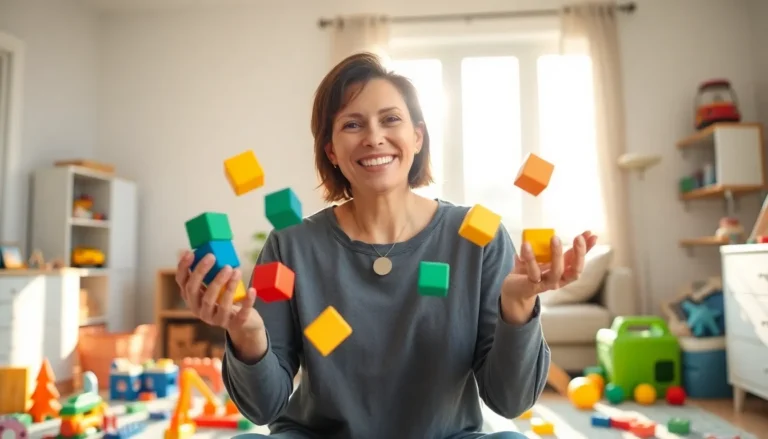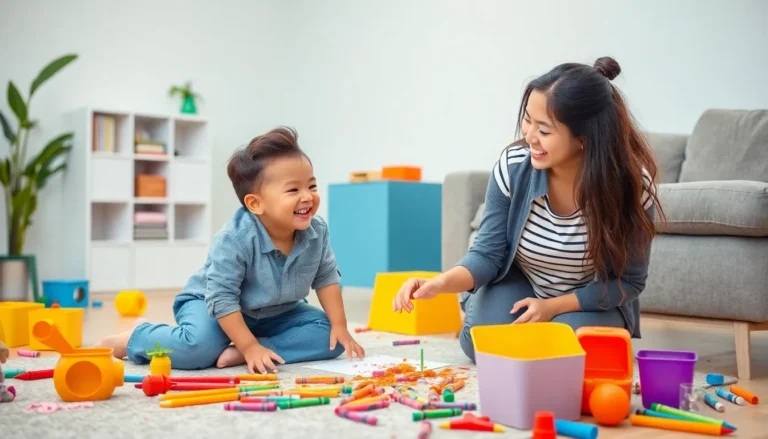Table of Contents
ToggleNavigating the wild world of parenting can feel like trying to assemble IKEA furniture without instructions—confusing and occasionally infuriating. Every parent knows that the journey is filled with unexpected twists, from toddler tantrums to teenage eye rolls. Yet, amidst the chaos, there’s a treasure trove of insights waiting to be uncovered.
Understanding parenting from different perspectives can transform the way one approaches challenges. It’s not just about surviving the sleepless nights or the never-ending laundry; it’s about embracing the unique experiences that shape both parents and children. By exploring various viewpoints, parents can find humor in the madness and wisdom in the struggle, creating a more enriching family life. So buckle up and get ready to dive into the delightful, messy, and often hilarious world of parenting perspectives.
Understanding Parenting Perspective
Parenting perspective encompasses the various viewpoints held by parents and children throughout their experiences together. Recognizing these differing insights can enhance family dynamics and enrich relationships.
Defining Parenting Perspective
Parenting perspective refers to the unique lenses through which parents and children view their experiences. Each person’s background, values, and emotions shape these lenses. Parents often draw from their own upbringing, while children interpret events based on their developmental stage. Acknowledging these differences enables clearer communication and understanding in the family unit. Collaborative conversations about expectations and emotions can foster empathy and bridge gaps in understanding.
The Importance of Perspective in Parenting
The significance of perspective in parenting is profound. It allows parents to appreciate the challenges faced by their children, promoting patience and compassion. Children benefit from understanding their parents’ hopes and concerns, fostering mutual respect. Recognizing the impact of situations on each perspective enhances conflict resolution. Studies indicate that families practicing perspective-taking experience lower levels of stress and improved relationships. Developing an open dialogue around individual viewpoints can lead to a more harmonious family environment.
Different Parenting Perspectives

Each parenting perspective offers unique insights into family dynamics. Understanding these viewpoints fosters empathy and respect among family members.
Authoritative Parenting
Authoritative parenting balances high demands with high responsiveness. Parents maintain clear expectations while supporting their children’s emotional needs. They encourage independence and effective communication, promoting problem-solving skills. Children raised with this style often exhibit higher self-esteem and better social skills. They learn to make choices, understanding the consequences of their actions. Research indicates that this approach leads to positive outcomes, including better academic performance and more stable relationships.
Authoritarian Parenting
Authoritarian parenting emphasizes obedience and discipline over emotional warmth. Parents assign strict rules, expecting compliance without discussion. Children may feel pressured to meet expectations, resulting in higher levels of anxiety and lower self-esteem. This style limits opportunities for open communication, leading to potential rebellion in adolescence. Studies show that children raised in authoritarian environments often struggle with social interactions and decision-making skills. This perspective prioritizes control, sacrificing emotional connection.
Permissive Parenting
Permissive parenting prioritizes warmth and acceptance while lacking enforceable rules. Parents often act more like friends than authority figures, allowing children significant freedom. Consequently, boundaries become blurred, and children may struggle with self-discipline. This style fosters creativity, yet it can hinder the development of important life skills. Research suggests permissive parenting can lead to challenges in academic settings and difficulty with authority later in life. Parents embracing this perspective emphasize nurturing but may overlook essential structure.
Uninvolved Parenting
Uninvolved parenting reflects a lack of responsiveness and emotional connection. Parents may be indifferent or preoccupied, leading to minimal engagement with their children. Such neglect can have severe consequences on a child’s development, resulting in issues with attachment and self-worth. Children often feel abandoned, impacting their academic performance and social relationships. This style may stem from various factors, including parental stress or lack of knowledge about effective parenting. Studies link uninvolved parenting to increased behavioral problems and emotional difficulties.
Influences on Parenting Perspective
Parenting perspectives shape family dynamics. Three significant influences include cultural factors, social environment, and personal experiences.
Cultural Factors
Cultural factors provide a foundation for parenting practices. Each culture often emphasizes different values, such as independence or collectivism. Parents influenced by collectivist cultures may prioritize family cohesion over individual achievements. In contrast, those from individualistic backgrounds might focus on self-expression and independence. These cultural lenses impact how parents interpret behaviors, communicate expectations, and resolve conflicts within the family.
Social Environment
Social environment significantly shapes parenting perspectives. Community norms, social networks, and peer influences all play a role. Positive peer support systems can encourage healthy parenting practices while negative influences may hinder effective discipline strategies. Parents also adapt their approaches based on expectations from friends and local communities. Thus, the surrounding social landscape profoundly affects decision-making and parenting styles.
Personal Experiences
Personal experiences shape a parent’s approach. Previous relationships and childhood experiences strongly inform current attitudes toward parenting. Traumatic events may lead to a desire for a nurturing environment, while positive memories can inspire effective practices. Furthermore, individual challenges, such as economic hardships, affect how parents prioritize resources and support their children. By reflecting on these experiences, parents can better understand their perspectives and adapt their parenting to cultivate healthier family dynamics.
Benefits of a Positive Parenting Perspective
A positive parenting perspective leads to numerous advantages for families. Improved understanding and empathy between parents and children forms the foundation of healthy relationships.
Improved Parent-Child Relationships
A strong connection grows when parents adopt a positive perspective. Parents who listen actively foster trust, making children feel valued and understood. Communication improves, allowing for discussions that strengthen emotional bonds. Conflict resolution becomes more effective, as parents and children view disagreements as opportunities for growth.
Enhanced Child Development
Positive parenting practices support children’s overall growth. Children thrive in environments where they feel safe and encouraged. Research indicates that emotional support contributes to better cognitive outcomes. When parents provide guidance without harsh discipline, it enhances their children’s self-esteem and resilience. Behavior improves as children learn to navigate challenges with confidence.
Better Emotional Well-being
Emotional well-being benefits from a supportive parenting approach. Parents who model empathy and emotional regulation set a positive example. Children develop healthier coping mechanisms when parents validate their feelings. Psychological studies demonstrate that children raised in nurturing environments exhibit lower anxiety and depression levels. Strong emotional foundations prepare children to face life’s challenges with confidence.
Strategies for Shifting Parenting Perspectives
Shifting parenting perspectives involves intentional strategies that promote understanding and connection within families.
Self-Reflection Techniques
Self-reflection helps parents identify their beliefs and biases. Journaling one’s thoughts can reveal patterns in parenting styles that require adjustment. Mindfulness practices foster awareness of emotional triggers during parenting moments. By considering past experiences, parents gain insight into how these shape current reactions with their children. Taking time to reflect enhances self-awareness, leading to more conscious and empathetic parenting choices.
Open Communication
Open communication builds trust between parents and children. Encouraging children to express their thoughts promotes honest dialogue about feelings and experiences. Active listening demonstrates respect for their viewpoints, making them feel valued. By setting aside distractions for focused conversations, the quality of interactions improves significantly. Facilitating regular family discussions about daily events strengthens connections and enhances understanding of each other’s perspectives.
Seeking Professional Guidance
Seeking professional guidance offers valuable insights into parenting challenges. Family therapists provide strategies suited to unique family dynamics, improving overall relationships. Joining parenting workshops can introduce new techniques and perspectives shared by experts and other parents. Consulting pediatricians about child development supports informed decision-making across various parenting issues. Utilizing professional resources fosters a supportive environment conducive to understanding and adapting parenting styles.
Parenting is a journey filled with unique challenges and rewards. Embracing different perspectives not only enriches family life but also fosters deeper connections. By recognizing and valuing the diverse viewpoints of both parents and children, families can navigate the complexities of parenting with empathy and understanding.
Implementing strategies for open communication and self-reflection can transform family dynamics. This proactive approach encourages growth and resilience, creating a nurturing environment where everyone thrives. Ultimately, the journey of parenting is about learning together and finding joy amid the chaos.








